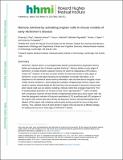Memory retrieval by activating engram cells in mouse models of early Alzheimer’s disease
Author(s)
Roy, Dheeraj; Arons, Autumn; Mitchell, Teryn; Pignatelli di Spinazzola, Michele; Ryan, Tomas John; Tonegawa, Susumu; ... Show more Show less
DownloadTonegawa_Memory retrieval.pdf (2.739Mb)
PUBLISHER_POLICY
Publisher Policy
Article is made available in accordance with the publisher's policy and may be subject to US copyright law. Please refer to the publisher's site for terms of use.
Terms of use
Metadata
Show full item recordAbstract
Alzheimer’s disease (AD) is a neurodegenerative disorder characterized by progressive memory decline and subsequent loss of broader cognitive functions. Memory decline in the early stages of AD is mostly limited to episodic memory, for which the hippocampus has a crucial role. However, it has been uncertain whether the observed amnesia in the early stages of AD is due to disrupted encoding and consolidation of episodic information, or an impairment in the retrieval of stored memory information. Here we show that in transgenic mouse models of early AD, direct optogenetic activation of hippocampal memory engram cells results in memory retrieval despite the fact that these mice are amnesic in long-term memory tests when natural recall cues are used, revealing a retrieval, rather than a storage impairment. Before amyloid plaque deposition, the amnesia in these mice is age-dependent, which correlates with a progressive reduction in spine density of hippocampal dentate gyrus engram cells. We show that optogenetic induction of long-term potentiation at perforant path synapses of dentate gyrus engram cells restores both spine density and long-term memory. We also demonstrate that an ablation of dentate gyrus engram cells containing restored spine density prevents the rescue of long-term memory. Thus, selective rescue of spine density in engram cells may lead to an effective strategy for treating memory loss in the early stages of AD.
Date issued
2016-03Department
Massachusetts Institute of Technology. Department of Biology; Massachusetts Institute of Technology. Department of Brain and Cognitive Sciences; Picower Institute for Learning and Memory; RIKEN-MIT Center for Neural Circuit GeneticsJournal
Nature
Publisher
Nature Publishing Group
Citation
Roy, Dheeraj S. et al. “Memory Retrieval by Activating Engram Cells in Mouse Models of Early Alzheimer’s Disease.” Nature 531.7595 (2016): 508–512.
Version: Author's final manuscript
ISSN
0028-0836
1476-4687